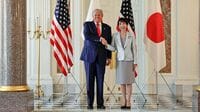TOKYO (Reuters) - Tens of thousands of protesters gathered near Japan's parliament building on Sunday to oppose legislation allowing the military to fight overseas, the latest sign of public mistrust in Prime Minister Shinzo Abe's security policy.
In one of Japan's biggest protests in years - organizers put the crowd at 120,000 - people of all ages braved occasional rain to join the rally, chanting and holding up placards with slogans such as "No War" and "Abe, quit".
Demonstrators swarmed into the street before parliament's main gate after the crowd size made it impossible for police, out in heavy numbers, to keep them to the sidewalks. A second nearby park area also filled with protesters.
The rally was one of more than 300 this weekend in Japan protesting Abe's move to loosen the post-war, pacifist constitution's constraints on the military.
"Sitting in front of TV and just complaining wouldn't do,"
said Naoko Hiramatsu, a 44-year-old associate professor in French and one of the Tokyo protesters.
"If I don't take action and try to put a stop on this, I will not be able to explain myself to my child in the future," said Hiramatsu, holding a four-year-old son in her arms in the thick of the protest.
Abe in July pushed through parliament's lower house a group of bills that let Japan's armed forces defend an ally under attack, a drastic shift in Japan's post-war security policy.
The bills are now before the upper chamber, which is also controlled by Abe's ruling bloc and aims to pass the legislation before parliament's session ends on Sept. 27.
Abe's ratings have taken a hit from opposition to the security bills. Media surveys showing those who oppose his government outnumber backers, and more than half are against the security bills.
"We need to make the Abe government realize the public is having a sense of crisis and angry. Let's work together to have the bills scrapped," Katsuya Okada, head of Japan's largest opposition party, the Democratic Party of Japan, told the Tokyo rally.
The demonstration was the biggest in Tokyo since the mass protests against nuclear power in the summer of 2012, after the March 2011 Fukushima atomic disaster.
(Reporting by Kiyoshi Takenaka and Linda Sieg; Editing by Richard Borsuk)



